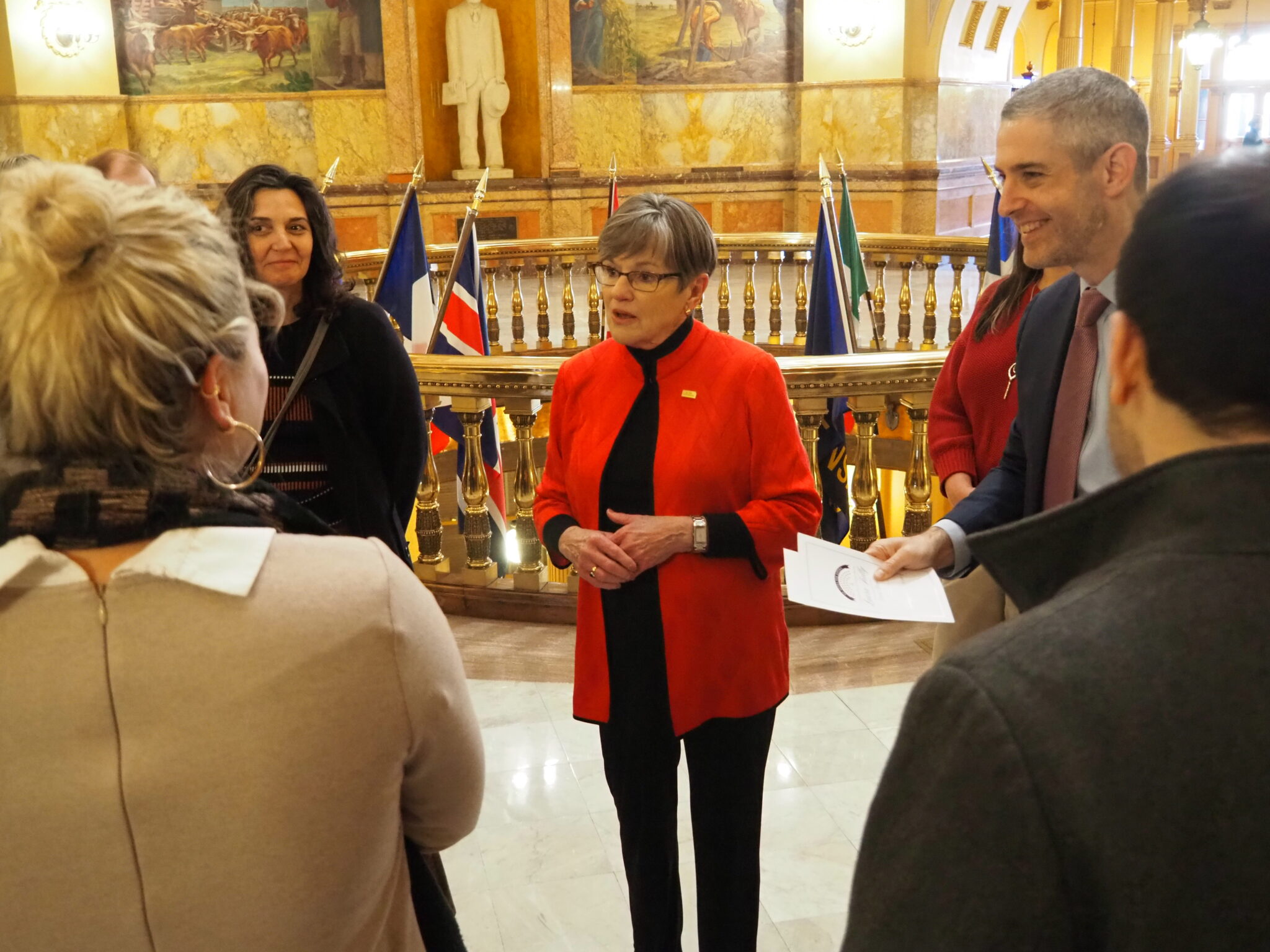National
Report: Trump joked Pence ‘wants to hang’ all gay people
Pence’s antigay record is no joking matter


President Trump reportedly joked Vice President Mike Pence wants to “wants to hang” all the gays. (Washington Blade file photo by Michael Key)
The anti-LGBT history of Vice President Mike Pence apparently isn’t lost on President Trump, who once joked his No. 2 in office “wants to hang” all the gay people, according to a recent article in the New Yorker.
The lengthy profile piece on Mike Pence contains significant details about his long career in politics starting as a U.S. House member, then Indiana governor and now vice president — highlighting Pence’s ties to the corporate right, including the Koch brothers, and the social conservative movement. (Recalling Pence’s time as a member of Congress, a former Republican staff member is quoted as saying Pence “was as far right as you could go without falling off the earth.”)
Although Pence has aided Trump is serving a liaison to Congress and administration officials, the article says Trump likes to “let Pence know who’s boss.” Citing two sources familiar with a meeting Trump and Pence had with a legal scholar, the article says Trump mocked his vice president’s views.
The legal scholar reportedly said if the U.S. Supreme Court overturned Roe v. Wade, many states would legalize abortion on their own, prompting Trump to say to Pence, “You see? You’ve wasted all this time and energy on it, and it’s not going to end abortion anyway.”
When the discussion at the meeting turned to gay rights, Trump motioned toward Pence and joked, “Don’t ask that guy — he wants to hang them all!”
Pence has a long anti-LGBT history that consists of voting against LGBT rights in Congress, including support for a U.S. constitutional amendment banning same-sex marriage nationwide as well as opposition to the Employment Non-Discrimination Act, hate crimes legislation and “Don’t Ask, Don’t Tell” repeal.
In 2000, Pence’s campaign material indicated he thinks funding for HIV programs should be contingent upon directing resources to “institutions which provide assistance to those seeking to change their sexual behavior.” Many have interpreted that to mean Pence supports widely discredited “ex-gay” conversion therapy, although a Pence spokesperson has said he never supports it.
Amid the enactment of anti-LGBT policy over the course of the administration, many have suspected Pence has facilitated that change based on history. In fact, sources have told the Los Angeles Blade the vice president is leading on those action, although Pence denied taking an active role in that.
The Washington Blade has placed a request in with the White House seeking comment on why Trump would make that joke and whether he thinks the death penalty for homosexual acts is a human rights violation. (The Trump administration came out strongly against foreign laws condemning gay people to death in a statement after the United States voted “no” on a controversial death penalty resolution at the United Nations.)
Arizona
Arizona Governor vetoes anti-trans, Ten Commandments bills
In a statement, the bill’s sponsor, Sen. Anthony Kern, R-Glendale, accused Hobbs of “abandoning God” with her veto

By Caitlin Sievers | PHOENIX, Ariz. – A slew of Republican bills, including those that would have allowed discrimination against transgender people and would have given public school teachers a green light to post the Ten Commandments in their classrooms, were vetoed by Gov. Katie Hobbs on Tuesday.
Hobbs, who has made it clear that she’ll use her veto power on any bills that don’t have bipartisan support — and especially ones that discriminate against the LGBTQ community — vetoed 13 bills, bringing her count for this year to 42.
Republicans responded with obvious outrage to Hobbs’ veto of their “Arizona Women’s Bill of Rights,” which would have eliminated any mention of gender in state law, replacing it with a strict and inflexible definition of biological sex. The bill would have called for the separation of sports teams, locker rooms, bathrooms and even domestic violence shelters and sexual assault crisis centers by biological sex, not gender identity, green-lighting discrimination against transgender Arizonans.
“As I have said time and again, I will not sign legislation that attacks Arizonans,” Hobbs wrote in a brief letter explaining why she vetoed Senate Bill 1628.
The Arizona Senate Republicans’ response to the veto was filled with discriminatory language about trans people and accused them of merely pretending to be a gender different than they were assigned at birth.
“With the radical Left attempting to force upon society the notion that science doesn’t matter, and biological males can be considered females if they ‘feel’ like they are, Katie Hobbs and Democrats at the Arizona State Legislature are showing their irresponsible disregard for the safety and well-being of women and girls in our state by killing the Arizona Women’s Bill of Rights,” Senate Republicans wrote in a statement.
The Senate Republicans went on to accuse the Democrats who voted against the bill of endangering women.
“Instead of helping these confused boys and men, Democrats are only fueling the dysfunction by pretending biological sex doesn’t matter,” Senate President Warren Petersen said in the statement. “Our daughters, granddaughters, nieces, and neighbors are growing up in a dangerous time where they are living with an increased risk of being victimized in public bathrooms, showers, and locker rooms because Democrats are now welcoming biological males into what used to be traditionally safe, single-sex spaces.”
But transgender advocates say, and at least one study has found, that there’s no evidence allowing transgender people to use the bathroom that aligns with their identity makes those spaces less safe for everyone else who uses them.
In the statement, the bill’s sponsor, Sen. Sine Kerr, R-Buckeye, claimed that the bill would have stopped transgender girls from competing in girls sports, something she said gives them an unfair advantage. But Republicans already passed a law to do just that in 2022, when Republican Gov. Doug Ducey was still in office, though that law is not currently being enforced amidst a court challenge filed by two transgender athletes.
Republicans also clapped back at Hobbs’ veto of Senate Bill 1151, which would have allowed teachers or administrators to teach or post the Ten Commandments in public school classrooms, a measure that some Republicans even questioned as possibly unconstitutional.
In a statement, the bill’s sponsor, Sen. Anthony Kern, R-Glendale, accused Hobbs of “abandoning God” with her veto.
“As society increasingly strays away from God and the moral principles our nation was founded upon, Katie Hobbs is contributing to the cultural degradation within Arizona by vetoing legislation today that would have allowed public schools to include the Ten Commandments in classrooms,” Kern said in the statement.
In her veto letter, Hobbs said she questioned the constitutionality of the bill, and also called it unnecessary. During discussion of the bill in March, several critics pointed out that posting the Ten Commandments in public school classrooms, tenets of Judeo-Christian religions, might make children whose families practice other religions feel uncomfortable.
“Sadly, Katie Hobbs’ veto is a prime example of Democrats’ efforts to push state-sponsored atheism while robbing Arizona’s children of the opportunity to flourish with a healthy moral compass,” Kern said.
Another Republican proposal on Hobbs’ veto list was Senate Bill 1097, which would have made school board candidates declare a party affiliation. School board races in Arizona are currently nonpartisan.
“This bill will further the politicization and polarization of Arizona’s school district governing boards whose focus should remain on making the best decisions for students,” Hobbs wrote in her veto letter. “Partisan politics do not belong in Arizona’s schools.”
******************************************************************************************

Caitlin joined the Arizona Mirror in 2022 with almost 10 years of experience as a reporter and editor, holding local government leaders accountable from newsrooms across the West and Midwest. She’s won statewide awards in Nebraska, Indiana and Wisconsin for reporting, photography and commentary.
******************************************************************************************
The preceding piece was previously published by the Arizona Mirror and is republished with permission.
Amplifying the voices of Arizonans whose stories are unheard; shining a light on the relationships between people, power and policy; and holding public officials to account.
Arizona Mirror is part of States Newsroom, the nation’s largest state-focused nonprofit news organization.
Virginia
Norfolk, Virginia transgender resource center vandalized
“This is a place you can come to get away from that, but to see that sprayed over the window. It’s kind of like you are walking into hell”

NORFOLK, Va. – The Norfolk Virginia Police Department is investigating the vandalism of a transgender resource center’s building.
Tarena Williams, founder of the Southeastern Transgender Resource Center, told WAVY that someone spraypainted anti-trans graffiti on the windows of her organization’s offices on Sunday or Monday morning. Williams told the Hampton Roads television station that seeing the messages was like “walking into hell.”
“I opened up STRC, even the Lamina House,” she told WAVY. “I opened up that to get away from those types of words. This is a place you can come to get away from that, but to see that sprayed over the window. It’s kind of like you are walking into hell. … To be honest, I was like in shock.”
Authorities are investigating the vandalism.
Indiana
Drag queen announces bid for mayor’s job in Fort Wayne, Indiana
The late Mayor Tom Henry was diagnosed with late-stage stomach cancer & experienced an emergency hospitalization, he died shortly after

FORT WAYNE, Ind. – In a Facebook post Tuesday, a local drag personality announced he was running for the office of mayor once held by the late Fort Wayne Mayor Tom Henry, who died last month just a few months into his fifth term.
Henry was recently diagnosed with late-stage stomach cancer and experienced an emergency that landed him in hospice care. He died shortly after.
ABC, NBC, and MyNetworkTV affiliate WPTA 21 reported that Fort Wayne resident Branden Blaettne, whose drag name is Della Licious, confirmed he filed paperwork to be one of the candidates seeking to finish out the fifth term of the late mayor.
Blaettner, who is a community organizer, told WPTA 21 he doesn’t want to “get Fort Wayne back on track,” but rather keep the momentum started by Henry going while giving a platform to the disenfranchised groups in the community. Blaettner said he doesn’t think his local fame as a drag queen will hold him back.
“It’s easy to have a platform when you wear platform heels,” Blaettner told WPTA 21. “The status quo has left a lot of people out in the cold – both figuratively and literally,” Blaettner added.

The Indiana Capital Chronicle reported that Rep. Phil GiaQuinta, who has led the Indiana House Democratic caucus since 2018, has added his name to a growing list of Fort Wayne politicos who want to be the city’s next mayor. A caucus of precinct committee persons will choose the new mayor.
According to the Fort Wayne Journal Gazette, the deadline for residents to file candidacy is at 10:30 a.m. April 17. A town hall with the candidates is scheduled for 6 p.m. April 18 at Franklin School Park. The caucus is set for 10:30 a.m. April 20 at the Lincoln Financial Event Center at Parkview Field.
At least six candidates so far have announced they will run in the caucus. They include Branden Blaettne, GiaQuinta, City Councilwoman Michelle Chambers, City Councilwoman Sharon Tucker, former city- and county-council candidate Palermo Galindo and 2023 Democratic primary mayoral candidate Jorge Fernandez.
Michigan
Michigan Democrats spar over LGBTQ+ inclusive hate crime law
Michigan could soon become the latest state to pass an LGBTQ-inclusive hate crime law but lawmakers disagree on just what kind of law to pass

By Rob Salerno | LANSING, Mich. – Michigan could soon become the latest state to pass an LGBTQ-inclusive hate crime law, but the state’s Democratic lawmakers disagree on just what kind of law they should pass.
Currently, Michigan’s Ethnic Intimidation Act only offers limited protections to victims of crime motivated by their “race, color, religion, gender, or national origin.” Bills proposed by Democratic lawmakers expand the list to include “actual or perceived race, color, religion, gender, sexual orientation, gender identity or expression, ethnicity, physical or mental disability, age, national origin, or association or affiliation with any such individuals.”
Democratic Governor Gretchen Whitmer and Attorney-General Dana Nessel have both advocated for a hate crime law, but house and senate Democrats have each passed different hate crimes packages, and Nessel has blasted both as being too weak.
Under the house proposal that passed last year (HB 4474), a first offence would be punishable with a $2000 fine, up to 2 years in prison, or both. Penalties double for a second offense, and if a gun or other dangerous weapons is involved, the maximum penalty is 6 years in prison and a fine of $7500.
But that proposal stalled when it reached the senate, after far-right news outlets and Fox News reported misinformation that the bill only protected LGBTQ people and would make misgendering a trans person a crime. Bill sponsor Rep. Noah Arbit was also made the subject of a recall effort, which ultimately failed.
Arbit submitted a new version of the bill (HB 5288) that added sections clarifying that misgendering a person, “intentionally or unintentionally” is not a hate crime, although the latest version (HB 5400) of the bill omits this language.
That bill has since stalled in a house committee, in part because the Democrats lost their house majority last November, when two Democratic representatives resigned after being elected mayors. The Democrats regained their house majority last night by winning two special elections.
Meanwhile, the senate passed a different package of hate crime bills sponsored by Sen. Sylvia Santana (SB 600) in March that include much lighter sentences, as well as a clause ensuring that misgendering a person is not a hate crime.
Under the senate bill, if the first offense is only a threat, it would be a misdemeanor punishable by 1 year in prison and up to $1,000 fine. A subsequent offense or first violent hate crime, including stalking, would be a felony that attracts double the punishment.
Multiple calls and emails from The Blade to both Rep. Arbit and Sen. Santana requesting comment on the bills for this story went unanswered.
The Attorney-General’s office sent a statement to The Blade supporting stronger hate crime legislation.
“As a career prosecutor, [Nessel] has seen firsthand how the state’s weak Ethnic Intimidation Act (not updated since the late 1980’s) does not allow for meaningful law enforcement and court intervention before threats become violent and deadly, nor does it consider significant bases for bias. It is our hope that the legislature will pass robust, much-needed updates to this statute,” the statement says.
But Nessel, who has herself been the victim of racially motivated threats, has also blasted all of the bills presented by Democrats as not going far enough.
“Two years is nothing … Why not just give them a parking ticket?” Nessel told Bridge Michigan.
Nessel blames a bizarre alliance far-right and far-left forces that have doomed tougher laws.
“You have this confluence of forces on the far right … this insistence that the First Amendment protects this language, or that the Second Amendment protects the ability to possess firearms under almost any and all circumstances,” Nessel said. “But then you also have the far left that argues basically no one should go to jail or prison for any offense ever.”
The legislature did manage to pass an “institutional desecration” law last year that penalizes hate-motivated vandalism to churches, schools, museums, and community centers, and is LGBT-inclusive.
According to data from the U.S. Department of Justice, reported hate crime incidents have been skyrocketing, with attacks motivated by sexual orientation surging by 70% from 2020 to 2022, the last year for which data is available.
Twenty-two states, DC, Puerto Rico, and the US Virgin Islands have passed LGBTQ-inclusive hate crime laws. Another 11 states have hate crime laws that include protections for “sexual orientation” but not “gender identity.”
Michigan Democrats have advanced several key LGBTQ rights priorities since they took unified control of the legislature in 2023. A long-stalled comprehensive anti-discrimination law was passed last year, as did a conversion therapy ban. Last month the legislature updated family law to make surrogacy easier for all couples, including same-sex couples.
A bill to ban the “gay panic” defense has passed the state house and is due for a senate committee hearing April 17.
******************************************************************************************

Rob Salerno is a writer and journalist based in Los Angeles, California, and Toronto, Canada.
Federal Government
Guatemalan LGBTQ+ activist granted asylum in US
Estuardo Cifuentes fled country in 2019

WASHINGTON — The U.S. has granted asylum to a Guatemalan LGBTQ+ activist who fled his country in 2019.
Estuardo Cifuentes and his partner ran a digital marketing and advertising business in Guatemala City.
He previously told the Washington Blade that gang members extorted from them. Cifuentes said they closed their business after they attacked them.
Cifuentes told the Blade that Guatemalan police officers attacked him in front of their home when he tried to kiss his partner. Cifuentes said the officers tried to kidnap him and one of them shot at him. He told the Blade that authorities placed him under surveillance after the incident and private cars drove past his home.
Cifuentes arrived in Matamoros, a Mexican border city that is across the Rio Grande from Brownsville, Texas, in June 2019. He asked for asylum in the U.S. based on the persecution he suffered in Guatemala because of his sexual orientation.
The Trump administration forced Cifuentes to pursue his asylum case from Mexico under its Migrant Protection Protocols program that became known as the “remain in Mexico” policy.
Cifuentes while in Matamoros ran Rainbow Bridge Asylum Seekers, a program for LGBTQ+ asylum seekers and migrants that the Resource Center Matamoros, a group that provides assistance to asylum seekers and migrants in the Mexican border city, helped create.
The Biden-Harris administration in January 2021 suspended enrollment in MPP. Cifuentes entered the U.S. on March 3, 2021.
“We are profoundly relieved and grateful that my husband and I have been officially recognized as asylees in the United States,” Cifuentes told the Blade on Monday in an email. “This result marks the end of a long and painful fight against the persecution that we faced in Guatemala because of our sexual orientation.”
Vice President Kamala Harris is among those who have said discrimination and violence based on sexual orientation are among the root causes of migration from Guatemala and other countries in Central America.
Cifuentes is now the client services manager for Lawyers for Good Government’s Project Corazón, a campaign that works “hard to reunite and defend the rights of families impacted by inhumane immigration policies.” He told the Blade he will continue to help LGBTQ+ asylum seekers and migrants.
“In this new chapter of our lives, we pledge to work hard to support others in similar situations and to contribute to the broader fight for the rights and acceptance of the LGBTQ+ migrant community,” said Cifuentes. “We are hopeful that our story will serve as a call to action to confront and end persecution based on gender identity and sexual orientation.”
Ohio
Ohio court temporarily blocks gender-affirming care ban
“Today’s ruling is a victory for transgender Ohioans & their families. The ban is an openly discriminatory breach of rights of trans youth”

COLUMBUS, Ohio – Today, the Franklin County Court of Common Pleas issued a temporary restraining order to prevent the ban on gender-affirming care for transgender youth from taking immediate effect.
A new lawsuit filed by the ACLU of Ohio alleges that the ban on gender-affirming care, passed into law earlier this year, violates multiple provisions of the Ohio state Constitution.
This action comes in the wake of a decision by the 6th Circuit Court of Appeals, under which Ohio falls, that dismissed federal constitutional concerns regarding bans on gender-affirming care for transgender youth. This latest legal challenge, however, focuses on the Ohio state Constitution and is filed in the Franklin County Court of Common Pleas.
According to the recently released filing, attorneys argue that a state constitutional amendment, passed by Republicans in 2011 to prevent the implementation of the Affordable Care Act (Obamacare), may, in fact, make the ban on gender-affirming care for transgender youth unconstitutional.
In 2011, Republicans in Ohio voiced concerns that the Affordable Care Act would limit healthcare choices. Misinformation about “death panels” became widespread nationally. At the same time, there was controversy over whether individuals could retain their doctors under the new federal healthcare program. In reaction, Ohio Republicans and the local Tea Party, a then-active anti-Obamacare movement within the Republican Party, advocated for a constitutional amendment to prohibit penalties related to the purchase of healthcare or health insurance. The amendment was approved by popular vote and took effect shortly thereafter.
The amendment reads as follows:
(B) No federal, state, or local law or rule shall prohibit the purchase or sale of health care or health insurance.
(C) No federal, state, or local law or rule shall impose a penalty or fine for the sale or purchase of health care or health insurance.
Now, in the latest lawsuit filed by the ACLU, attorneys argue that the new gender affirming care ban for transgender youth set to go into effect on April 24th violates these constitutional protections in the state. In the lawsuit, attorneys argue that “gender-affirming care, including the prescription of puberty-delaying medication and/or hormone therapy to minor patients where appropriate in the judgment of a physician, is ‘health care’ within the meaning of Article I, Section 21.” They argue that the law imposes penalties and prohibits the purchase of health care, rendering it unconstitutional.
The plaintiffs, represented by the American Civil Liberties Union, the ACLU of Ohio, and the global law firm Goodwin Procter, successfully argued that the plaintiffs are likely to win their claim that House Bill 68 violates the Ohio Constitution because it covers more than one single subject.
The Court enjoined the Health Care Ban as well as a ban on transgender girls participating on girls or women’s sports teams that was also contained within House Bill 68.
In a statement the ACLU said that the group will continue the litigation to ultimately obtain a permanent injunction on behalf of Ohio families whose children are at risk of losing critical life-saving medical care.
The temporary restraining order is in effect for 14 days or until the hearing of plaintiffs’ motion for a preliminary injunction, whichever is sooner. HB 68 was originally set to take effect on April 24.
“We are thrilled and relieved that Ohio’s ban on gender-affirming health care has been halted and that transgender youth can continue, for the near term at least, to access medically necessary healthcare,” Freda Levenson, Legal Director for the ACLU of Ohio, said. “Our legal battle will continue until, we hope, this cruel restriction is permanently blocked. Ohio families have a constitutional right to make personal healthcare decisions without government intrusion.”
Harper Seldin, an ACLU Staff Attorney noted:
“Today’s ruling is a victory for transgender Ohioans and their families. Ohio’s ban is an openly discriminatory breach of the rights of transgender youth and their parents alike and presents a real danger to the same young people it claims to protect. We are committed to opposing this law until it is permanently overturned, making Ohio a safer place to raise every family.”
Allison DeLaurentis and Miranda Hooker, Complex Litigation & Dispute Resolution Partners, for the law firm of Goodwin Procter said:
“Today’s ruling not only upholds the rights of transgender individuals but also champions the principle that healthcare should be accessible, and above all, inclusive.”
Additional reporting by Erin Reed
Kansas
Kansas Governor lets web porn bill become law without signature
Critics warn it could censor works of art, classic books and LGBTQ content, as well as provide sensitive ID info to unregulated 3rd parties

By Tim Carpenter | TOPEKA, Kan. — Gov. Laura Kelly chose not to veto a bill Friday that earned bipartisan support among House and Senate members eager to require commercial websites to deploy age-verification software to limit online access by Kansas minors to nudity or sexually exciting images and text.
Kelly, a Democratic governor working with a Legislature brandishing Republican supermajorities, said she would allow Senate Bill 394 to become law without her signature despite reservations the restrictions could trample constitutional rights and inspire legal challenges.
The bill was approved unanimously in the Senate and on a 92-31 vote by the House. That left little doubt the Senate could muster 27 votes and the House could bring together 84 votes to beat a veto.
“While well-meaning in its efforts to protect children from content the Legislature considers ‘harmful to minors,’ this bill is vague in its application and may end up infringing on constitutional rights, which is an issue being litigated in other jurisdictions over similar bills,” Kelly said.
Under the bill, parents or guardians of anyone under 18 gaining access to online pornography could file a lawsuit and seek damages of $50,000 or more against companies that didn’t successfully screen minors from material depicting or describing nudity, sexual conduct, sexual excitement or sadomasochistic abuse in a manner offensive to community standards. The mandate would apply to websites if at least one-fourth of viewed pages in any month contained material offensive to minors.
Identical versions of the bill were introduced by Salina Sen. J.R. Claeys and Wichita Rep. Patrick Penn, both Republicans, to require identity verification technology to deflect youthful consumers who might be drawn to raunchy online content posted anywhere in the world. The attorney general would be responsible for investigating reports of noncompliance. He could seek penalties of $500 to $10,000 for each underage visit to an off-limits site.
“Defending the integrity of the family is a core value of the Catholic church,” said Chuck Weber, executive director of the Kansas Catholic Conference and a proponent of the bill. “SB 394 is very good legislation that will help prevent the pornography industry from capturing and addicting our youth to destructive behavior.”
More red tape
On Friday, the Kansas governor vetoed a bill that would require the state budget director to determine the cost of complying with all rules and regulations drafted by state agencies. It would grant the gubernatorially appointed budget director authority to reject rules and regulations.
Kelly said the bill was objectionable because it “would insert bureaucratic red tape intended to legislatively interfere with the timely implementation of necessary and important rules and regulations. Many of these regulations are for the protection and safety of Kansans.”
The vote in the Senate was 27-13. It cleared the House 81-39.
The measure was championed by lawmakers keen to rein in state regulations or rules considered burdensome or that added to the cost of doing business in Kansas. It would target any rule or regulation if implementation or compliance costs incurred by a business over a five-year period topped $1 million. That benchmark could be exceeded if the Legislature ratified the proposed state rule or regulation.
“This veto can be easily explained by a difference in philosophies,” said House Speaker Dan Hawkins, R-Wichita. “The governor and her party believe that more government control is the answer to our problems. House Republicans believe there should be checks placed on the administrative state and that’s why we’ll be working to override her veto and rein in the power grab by unelected bureaucrats.”
Randy Stookey, a lobbyist representing the Kansas Grain and Feed Association, said regulatory compliance with state rules and regulations often came at a high cost.
“This economic impact is something that must be considered carefully,” he said. “Modeled after recent legislation in other states, the bill would enhance the review of required state agency analysis of the implementation and compliance costs of proposed regulations on the regulated community.”
Regulating bags, hair
The Legislature approved a bill advocated by business lobbying interests to prohibit cities and county governments from regulating containers used to distribute goods. The bill would forbid government intrusion into design of bags, cups, packages, containers, bottles, devices — even straws — preferred by a retailer.
House Bill 2446 would allow containers made of paper, plastic, cardboard, cloth, aluminum, glass or recycled materials. In other words, the prohibition against Lawrence businesses using single-use thin plastic bags — common in grocery stores or for carry-out food — would be nullified.
Kelly vetoed the bill because she considered it an overreach by the Legislature into decisions of officials elected to serve in municipal government.
“I believe in local control and that local officials should be held accountable by their constituents, stakeholders and businesses,” Kelly said. “This bill lacks sufficient protection to ensure local units of government are able to play a meaningful role in decision making on issues impacting their communities.”
Meanwhile, Kelly vetoed Senate Bill 434 that would deregulate the practice of hair removal known as “sugaring.” She expressed concern withdrawing the state from oversight of temporary hair removal by application of sugar, lemon and water, or its equivalent, could be harmful to minors.
“I have serious concerns that deregulating sugaring … could lead to safety and sanitation problems,” Kelly said. “We have a responsibility to protect Kansans, and this deregulation would threaten the health and safety of Kansans, particularly our children.”
She said it was proper to keep regulation of the industry within purview of the Kansas Board of Cosmetology. She said practitioners should be held to health and safety standards of cosmetologists, which would include criminal background checks, training and state licensing.
******************************************************************************************

Tim Carpenter has reported on Kansas for 35 years. He covered the Capitol for 16 years at the Topeka Capital-Journal and previously worked for the Lawrence Journal-World and United Press International.
The preceding story was previously published by the Kansas Reflector and is republished with permission.
******************************************************************************************
The Kansas Reflector is a nonprofit news operation providing in-depth reporting, diverse opinions and daily coverage of state government and politics. This public service is free to readers and other news outlets. We are part of States Newsroom: the nation’s largest state-focused nonprofit news organization, with reporting from every capital.
U.S. Federal Courts
Appeals court strikes down West Virginia trans athlete ban

By Lori Kersey | RICHMOND, Va. – The U.S. Fourth Circuit Court of Appeals has struck down West Virginia’s ban on transgender athletes, finding the law violates transgender students’ rights under the Equal Protection Clause of the constitution and Title IX, a federal civil rights law prohibiting discrimination based on sex in education programs.
The case, B.P.J. vs. the West Virginia Board of Education, was filed in May 2021 on behalf of Becky Pepper-Jackson, a 13-year-old transgender middle school student and track athlete who would be barred from participating if the ban is upheld. Pepper-Jackson is represented by the American Civil Liberties Union, the American Civil Liberties Union of West Virginia and Lambda Legal.
In April 2021, West Virginia Gov. Jim Justice signed into law a bill prohibiting transgender women and girls in the state from participating in sports that align with their gender identity. The U.S. Court of Appeals in February 2023 blocked the state from removing Pepper-Jackson from her school’s track and field team as legal advocates appealed a lower court’s ruling upholding the ban.
In Tuesday’s ruling, Judge Toby Heytens wrote that offering Pepper-Jackson the “choice” between not participating in sports and participating only on boys teams is not a real choice.
“The defendants cannot expect that B.P.J. will countermand her social transition, her medical treatment, and all the work she has done with her schools, teachers, and coaches for nearly half her life by introducing herself to teammates, coaches, and even opponents as a boy,” the judge wrote.
“By participating on boys teams, B.P.J. would be sharing the field with boys who are larger, stronger, and faster than her because of the elevated levels of circulating testosterone she lacks,” he wrote. “The Act thus exposes B.P.J. to the very harms Title IX is meant to prevent by effectively ‘exclud[ing]’ her from ‘participation in’ all non-coed sports entirely.”
In a statement Tuesday, Joshua Block, senior staff attorney for the ACLU’s LGBTQ & HIV Project, called the court’s ruling “a tremendous victory for our client, transgender West Virginians, and the freedom of all youth to play as who they are.”
“It also continues a string of federal courts ruling against bans on the participation of transgender athletes and in favor of their equal participation as the gender they know themselves to be,” Block wrote. “This case is fundamentally about the equality of transgender youth in our schools and our communities and we’re thankful the Fourth Circuit agreed.”
“We hope today’s ruling sends a message of hope to the trans youth of West Virginia,” Aubrey Sparks, legal director of the ACLU of West Virginia, said in the statement. “And a message of warning to politicians who continue to dehumanize this vulnerable population.”
West Virginia is one of 21 states that have banned transgender student-athletes over the last three years, according to the ACLU.
In a statement Tuesday, West Virginia Attorney General Patrick Morrisey vowed to defend the ban and said he is “deeply disappointed” in the decision.
“The Save Women’s Sports Act is ‘constitutionally permissible’ and the law complies with Title IX,” Morrisey said. “I will keep fighting to safeguard Title IX. We must keep working to protect women’s sports so that women’s safety is secured and girls have a truly fair playing field. We know the law is correct and will use every available tool to defend it.”
******************************************************************************************

Lori Kersey is a reporter with a decade of experience reporting in West Virginia. She covers state government for West Virginia Watch.
******************************************************************************************
The preceding article was previously published by the West Virginia Watch and is republished with permission.
Nonprofit, nonpartisan, independent journalism not hidden behind a paywall. Mountaineers are always free, and so is West Virginia Watch.
West Virginia Watch is part of States Newsroom, the nation’s largest state-focused nonprofit news organization.
U.S. Federal Courts
U.S. Supreme Court allows Idaho to enforce gender care ban
SCOTUS sides with state to allow enforcement of gender-affirming care ban for youth. Poe v. Labrador lawsuit remains ongoing.

By Mia Maldonado | WASHINGTON – The U.S. Supreme Court has allowed Idaho to enforce House Bill 71, a law banning Idaho youth from receiving gender-affirming care medications and surgeries.
In an opinion issued Monday, the U.S. Supreme Court granted the state of Idaho’s request to stay the preliminary injunction, which blocked the law from taking effect. This means the preliminary injunction now only applies to the plaintiffs involved in Poe v. Labrador — a lawsuit brought on by the families of two transgender teens in Idaho who seek gender-affirming care.
Monday’s U.S. Supreme Court decision enforces the gender-affirming care ban for all other transgender youth in Idaho as the lawsuit remains ongoing in the Ninth Circuit Court of Appeals.

The American Civil Liberties Union and the ACLU of Idaho, both of whom represent the plaintiffs, said in a press release Monday that the ruling “does not touch upon the constitutionality” of House Bill 71. The groups called Monday’s ruling an “awful result” for transgender Idaho youth and their families.
“Today’s ruling allows the state to shut down the care that thousands of families rely on while sowing further confusion and disruption,” the organizations said in the press release. “Nonetheless, today’s result only leaves us all the more determined to defeat this law in the courts entirely, making Idaho a safer state to raise every family.”
Idaho Attorney General Raúl Labrador in a press release said the state has a duty to protect and support all children, and that he is proud of the state’s legal stance.
“Those suffering from gender dysphoria deserve love, support and medical care rooted in biological reality,” Labrador said. “Denying the basic truth that boys and girls are biologically different hurts our kids. No one has the right to harm children, and I’m grateful that we, as the state, have the power — and duty — to protect them.”
Recap of Idaho’s House Bill 71, and what led to SCOTUS opinion
Monday’s Supreme Court decision traces back to when House Bill 71 was signed into law in April 2023.
The law makes it a felony punishable for up to 10 years for doctors to provide surgeries, puberty-blockers and hormones to transgender people under the age of 18. However, gender-affirming surgeries are not and were not performed among Idaho adults or youth before the bill was signed into law, the Idaho Capital Sun previously reported.
One month after it was signed into law, the families of two transgender teens sued the state in a lawsuit alleging the bill violates the 14th Amendment’s guarantee of equal protection under the law.
In late December, just days before the law was set to take effect in the New Year, District of Idaho Judge B. Lynn Winmill blocked the law from taking effect under a preliminary injunction. In his decision, he said he found the families likely to succeed in their challenge.
The state of Idaho responded by appealing the district court’s preliminary injunction decision to the Ninth Circuit, to which the Ninth Circuit denied. The state of Idaho argued the court should at least enforce the ban for everyone except for the plaintiffs.
After the Ninth Circuit’s denial, the Idaho Attorney General’s Office in February sent an emergency motion to the U.S. Supreme Court, the Idaho Press reported. Monday’s U.S. Supreme Court decision agrees with the state’s request to enforce its ban on transgender health care for minors, except for the two plaintiffs.
******************************************************************************************

Mia Maldonado joined the Idaho Capital Sun after working as a breaking news reporter at the Idaho Statesman covering stories related to crime, education, growth and politics. She previously interned at the Idaho Capital Sun through the Voces Internship of Idaho, an equity-driven program for young Latinos to work in Idaho news. Born and raised in Coeur d’Alene, Mia moved to the Treasure Valley for college where she graduated from the College of Idaho with a bachelor’s degree in Spanish and international political economy.
******************************************************************************************
The preceding piece was previously published by the Idaho Capital Sun and is republished with permission.
The Idaho Capital Sun is the Gem State’s newest nonprofit news organization delivering accountability journalism on state politics, health care, tax policy, the environment and more.
We’re part of States Newsroom, the nation’s largest state-focused nonprofit news organization.
Oklahoma
HRC paid ad highlights Owasso LGBTQ students like Nex Benedict
Marley H. describes her experience that included bullying, harassment, anti-gay slurs–and teachers, administrators who refused to step in

OWASSO, Okla. – Marley H., an Owasso High School grad and Oklahoman speaks to the culture of harassment and bullying she witnessed firsthand during her time in the Owasso school district, how it impacted her and her fellow students, and what she sees as the way forward for the district and state.
In this new video, which HRC will be promoting with a paid investment on social platforms, Marley speaks from her heart about what she and her fellow students experienced at Owasso High School, including bullying, the use of anti-LGBTQ+ slurs, harassment, and – worse still – teachers and administrators who refused to step in and disrupt this cycle of hate.
“It hurts to know that not only do your teachers personally not support you, if a student bullies you or harasses you or calls you names, they aren’t going to do anything about it,” said Marley H., who graduated from Owasso High School in 2022. “It promotes a culture where you feel like you shouldn’t report issues.”
The video’s release comes as the LGBTQ+ community marks two months since the death of Nex Benedict, a 16 year old Owasso student who died after being assaulted in their school bathroom and bullied and harassed for over a year.
In March, HRC launched “Walters Watch,” part of a high-impact accountability campaign to hold Ryan Walters, Oklahoma’s Superintendent of Public Instruction, accountable for his extremist rhetoric and mis-management of Oklahoma schools, contributing to the culture of bullying and harassment.
The HRC notes that “whether he is appointing far-right figures like “LibsOfTikTok” creator Chaya Raichik to state boards or demonizing teachers’ unions, Walters seems dead-set on using his role as Superintendent as a political stepping-stone rather than taking seriously his responsibility to Oklahoma students.”
Last month, the U.S. Department of Education informed HRC president Kelley Robinson that the department will open an investigation in response to HRC’s letter regarding Owasso Public Schools and its failure to respond appropriately to sex-based harassment that may have contributed to the tragic death of Nex Benedict.
This investigation was triggered by a formal complaint made by Robinson, who wrote to U.S. Secretary of Education Miguel Cardona and asked his department to use the enforcement mechanisms at its disposal to prevent similar tragedies from taking place in the future and to help hold accountable those responsible for Nex’s tragic death.
“We’ve heard many students at Owasso and elsewhere in Oklahoma speak truth to power and stand up against the culture of bullying and harassment fostered by people like Ryan Walters,” said Kelley Robinson, president of the Human Rights Campaign. “Marley’s story breaks our hearts as much as it angers us. There is a way forward, however. Each time someone speaks out about what they have seen, experienced, or heard, the truth becomes harder and harder to deny. The first step on the journey to healing is for Ryan Walters to go.”
Related:
******************************************************************************************
The Human Rights Campaign is America’s largest civil rights organization working to achieve equality for lesbian, gay, bisexual, transgender and queer (LGBTQ+) people. HRC envisions a world where LGBTQ+ people are embraced as full members of society at home, at work and in every community.
-

 Political commentary & analysis3 days ago
Political commentary & analysis3 days agoThe Cass Review heralds how all trans medicine will die
-

 West Hollywood4 days ago
West Hollywood4 days agoOut stylist found beaten outside Heart WeHo nightclub recovering
-

 Sports2 days ago
Sports2 days agoWNBA star Brittney Griner & wife Cherelle expecting first child
-

 West Hollywood5 days ago
West Hollywood5 days agoVinson is leading riders in 2024 WeHo Pride & Dyke march
-

 North Carolina4 days ago
North Carolina4 days ago“Rainbow Story Time” gets bomb threat, closes Durham N.C. library
-

 West Hollywood5 days ago
West Hollywood5 days agoWest Hollywood in brief- City government in action this week
-

 Political commentary & analysis3 days ago
Political commentary & analysis3 days agoEU elections, empowering queer women & need for safe spaces
-

 Idaho5 days ago
Idaho5 days agoIdaho ends legislative session, anti-LGBTQ+ bills sent to governor
-

 Los Angeles2 days ago
Los Angeles2 days agoLA leaders call for unity & protection for trans community
-

 Travel4 days ago
Travel4 days agoHot fun in the desert sun: Your Palm Springs guide
















